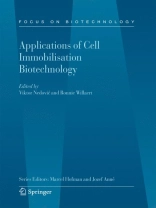Cell immobilisation biotechnology is a multidisciplinary area, shown to have an important impact on many scientific subdisciplines – including biomedicine, pharmacology, cosmetology, food and agricultural sciences, beverage production, industrial waste treatment, analytical applications, biologics production. ’Cell Immobilisation Biotechnology’ is an outcome of the editors’ intention to collate the extensive and widespread information on fundamental aspects and applications of immobilisation/encapsulation biotechnology into a comprehensive reference work and to provide an overview of the most recent results and developments in this domain.
‘Cell Immobilisation Biotechnology’ is divided into the two book volumes, FOBI 8A and FOBI 8B. The FOBI 8A volume, Fundamentals of Cell Immobilisation Biotechnology, is dedicated to fundamental aspects of cell immobilisation while the present volume, FOBI 8B, Applications of Cell Immobilisation Biotechnology, deals with diverse applications of this technology.
قائمة المحتويات
Tissue Engineering.- Bio-Artificial Organs.- Bioartificial Pancreas: An Update.- Bioartificial Skin.- Bioartificial Liver.- Tissue-Engineered Blood Vessels and the Future of Tissue Substitutes.- Tissue Engineering of Cartilage and Myocardium.- Tissue Engineered Heart.- Bone Tissue Engineering.- Stem Cells — Potential for Tissue Engineering.- Microencapsulation for Disease Treatment.- Challenges in Cell Encapsulation.- Protein Therapeutic Delivery Using Encapsulated Cell Platform.- Cell Encapsulation Therapy for Malignant Gliomas.- Gene Therapy Using Encapsulated Cells.- Artificial Cells for Blood Substitutes, Enzyme Therapy, Cell Therapy and Drug Delivery.- Food and Beverage Applications.- Beer Production Using Immobilised Cells.- Application of Immobilisation Technology to Cider Production: A Review.- Wine Production by Immobilised Cell Systems.- Immobilised Cell Technologies for the Dairy Industry.- Food Bioconversions and Metabolite Production.- Immobilised-Cell Technology and Meat Processing.- Bioflavouring of Foods and Beverages.- Industrial Biochemical Production.- Production of Ethanol Using Immobilised Cell Bioreactor Systems.- Production of Biopharmaceuticals Through Microbial Cell Immobilisation.- Production of Biologics from Animal Cell Cultures.- Stabilisation of Probiotic Microorganisms.- Growth of Insect and Plant Cells Immobilised Using Electrified Liquid Jets.- Plant Cell Immobilisation Applications.- Environmental and Agricultural Applications.- Wastewater Treatment by Immobilised Cell Systems.- Immobilised Cell Strategies for the Treatment of Soil and Groundwaters.- Application of Immobilised Cells for Air Pollution Control.- Artificial Seeds.- Spermatozoal Microencapsulation for Use in Artificial Insemination of Farm Animals.- Biosensors with Immobilised Microbial Cells Using Amperometric and Thermal Detection Principles.












